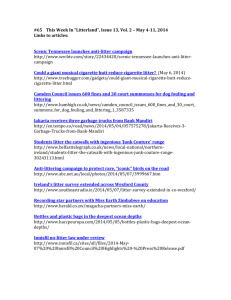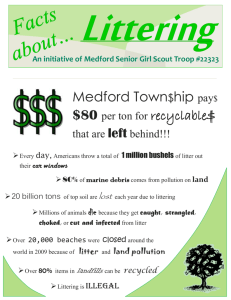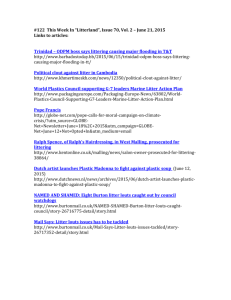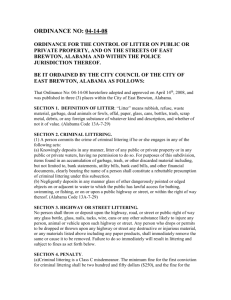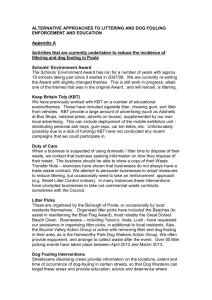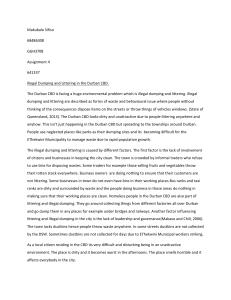(Attachment: 5)Appendix B (17K/bytes)
advertisement
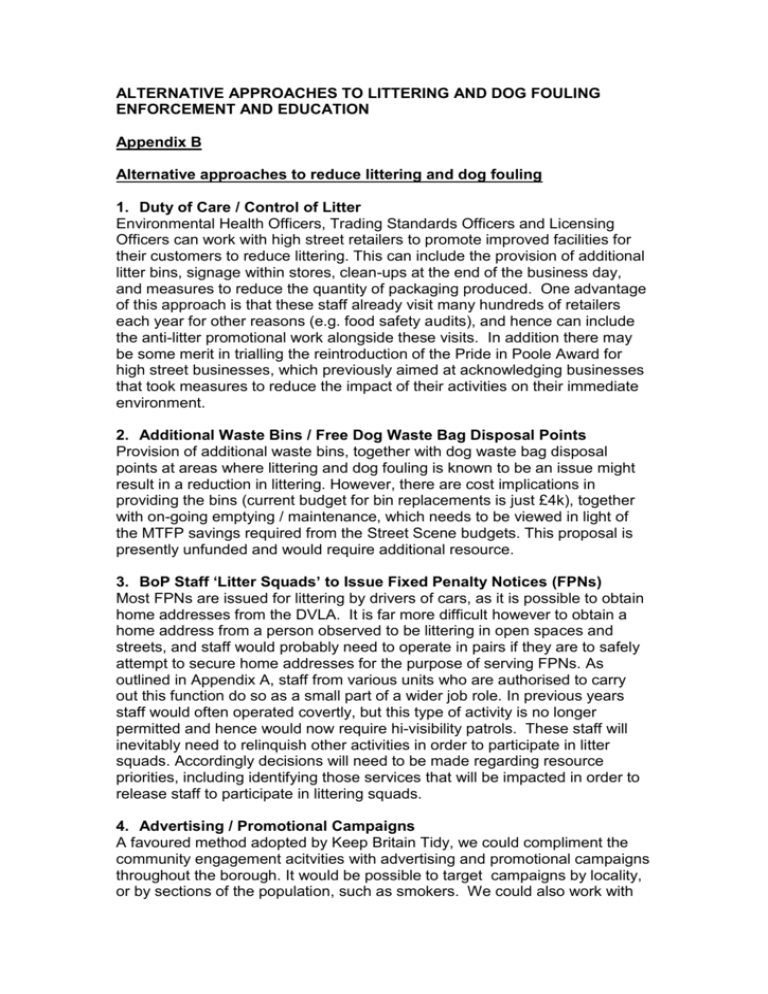
ALTERNATIVE APPROACHES TO LITTERING AND DOG FOULING ENFORCEMENT AND EDUCATION Appendix B Alternative approaches to reduce littering and dog fouling 1. Duty of Care / Control of Litter Environmental Health Officers, Trading Standards Officers and Licensing Officers can work with high street retailers to promote improved facilities for their customers to reduce littering. This can include the provision of additional litter bins, signage within stores, clean-ups at the end of the business day, and measures to reduce the quantity of packaging produced. One advantage of this approach is that these staff already visit many hundreds of retailers each year for other reasons (e.g. food safety audits), and hence can include the anti-litter promotional work alongside these visits. In addition there may be some merit in trialling the reintroduction of the Pride in Poole Award for high street businesses, which previously aimed at acknowledging businesses that took measures to reduce the impact of their activities on their immediate environment. 2. Additional Waste Bins / Free Dog Waste Bag Disposal Points Provision of additional waste bins, together with dog waste bag disposal points at areas where littering and dog fouling is known to be an issue might result in a reduction in littering. However, there are cost implications in providing the bins (current budget for bin replacements is just £4k), together with on-going emptying / maintenance, which needs to be viewed in light of the MTFP savings required from the Street Scene budgets. This proposal is presently unfunded and would require additional resource. 3. BoP Staff ‘Litter Squads’ to Issue Fixed Penalty Notices (FPNs) Most FPNs are issued for littering by drivers of cars, as it is possible to obtain home addresses from the DVLA. It is far more difficult however to obtain a home address from a person observed to be littering in open spaces and streets, and staff would probably need to operate in pairs if they are to safely attempt to secure home addresses for the purpose of serving FPNs. As outlined in Appendix A, staff from various units who are authorised to carry out this function do so as a small part of a wider job role. In previous years staff would often operated covertly, but this type of activity is no longer permitted and hence would now require hi-visibility patrols. These staff will inevitably need to relinquish other activities in order to participate in litter squads. Accordingly decisions will need to be made regarding resource priorities, including identifying those services that will be impacted in order to release staff to participate in littering squads. 4. Advertising / Promotional Campaigns A favoured method adopted by Keep Britain Tidy, we could compliment the community engagement acitvities with advertising and promotional campaigns throughout the borough. It would be possible to target campaigns by locality, or by sections of the population, such as smokers. We could also work with schools and colleges in order to educate people at an earlier age. Some more radical approaches could include the provision of transparant receptacles in public areas which could be filled with the litter collected on that day, and the cessation of street cleansing for a day in areas of high littering; such approaches would throw a spotlight on the amount of littering that occurs within any one day. Clearly there are costs implications with some of these proposals. 5. Community Participation / Volunteering Building upon the localism agenda, we could encourage further participation of community groups and individuals in volunteering to cleanse public areas that are currently cleansed by Street Scene services. This could even extend to cleansing the areas immediately beyond the curtilage of houses within residential streets. Whilst being a challenge to some residents’ expectations of cleansing policy, such initiatives have the potential to secure considerable savings to Street Scene budgets.
